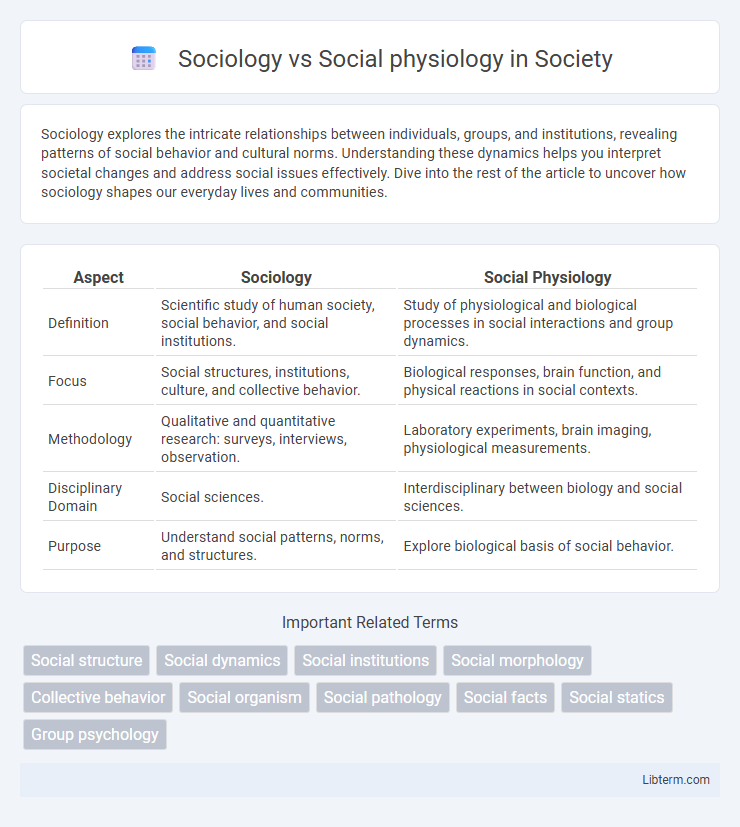Sociology explores the intricate relationships between individuals, groups, and institutions, revealing patterns of social behavior and cultural norms. Understanding these dynamics helps you interpret societal changes and address social issues effectively. Dive into the rest of the article to uncover how sociology shapes our everyday lives and communities.
Table of Comparison
| Aspect | Sociology | Social Physiology |
|---|---|---|
| Definition | Scientific study of human society, social behavior, and social institutions. | Study of physiological and biological processes in social interactions and group dynamics. |
| Focus | Social structures, institutions, culture, and collective behavior. | Biological responses, brain function, and physical reactions in social contexts. |
| Methodology | Qualitative and quantitative research: surveys, interviews, observation. | Laboratory experiments, brain imaging, physiological measurements. |
| Disciplinary Domain | Social sciences. | Interdisciplinary between biology and social sciences. |
| Purpose | Understand social patterns, norms, and structures. | Explore biological basis of social behavior. |
Introduction to Sociology and Social Physiology
Sociology studies human social behavior, institutions, and structures, analyzing patterns and functions within societies. Social physiology explores the biological and psychological mechanisms underlying social interactions, emphasizing the physiological processes influencing behavior. Introduction to Sociology provides foundational knowledge of social theories and institutions, while Social Physiology focuses on the interplay between physiological factors and social phenomena.
Defining Sociology: Scope and Focus
Sociology examines the structured patterns of social relationships, institutions, and collective behaviors within human societies, emphasizing how cultural norms, social roles, and group dynamics influence individual and collective actions. It covers diverse topics such as social stratification, family structures, education systems, and social change, analyzing interactions at both micro and macro levels. Social physiology, by contrast, focuses on the biological and physiological processes underlying social behavior, investigating how hormonal, neural, and genetic factors contribute to social bonding, communication, and group functionality.
Understanding Social Physiology: Core Concepts
Social physiology studies how physiological processes influence social behavior, emphasizing the interaction between biological systems and social environments. Core concepts include stress responses, neuroendocrine mechanisms, and their impact on group dynamics and human interactions. Sociology contrasts by focusing on social structures, institutions, and collective behavior without delving deeply into biological bases.
Historical Development of Both Disciplines
Sociology emerged in the 19th century through thinkers like Auguste Comte and Emile Durkheim, focusing on social structures, institutions, and collective behavior within societies. Social physiology, developed in the late 19th and early 20th centuries, investigates the biological foundations of social behavior, integrating physiological processes with social interactions. The historical development of sociology prioritized macro-level analysis of societies, while social physiology evolved to explore micro-level biological mechanisms influencing social phenomena.
Key Theoretical Frameworks in Sociology
Sociology primarily relies on key theoretical frameworks such as Structural Functionalism, which views society as a complex system with interrelated parts working together to maintain stability, Conflict Theory, emphasizing power struggles and inequality driving social change, and Symbolic Interactionism, focusing on daily human interactions and the creation of social meanings. In contrast, Social Physiology, often linked to social psychology, explores how biological processes influence social behaviors using frameworks like Biopsychosocial Models that integrate physiological, psychological, and social factors. These distinct approaches highlight sociology's macro-level analysis of social structures versus social physiology's micro-level examination of biological underpinnings in social contexts.
Fundamental Principles of Social Physiology
Social physiology studies the interaction between biological processes and social behavior, emphasizing how physiological mechanisms influence social structures and group dynamics. Fundamental principles of social physiology include the regulation of social interactions through neural and hormonal pathways, the impact of stress responses on social cohesion, and the adaptive role of physiological processes in maintaining societal stability. Unlike sociology, which focuses on social institutions and cultural norms, social physiology integrates biological factors to understand the foundation of social behavior.
Comparative Methodologies: Sociology vs Social Physiology
Sociology employs qualitative and quantitative research methods to analyze social structures, institutions, and interactions within human societies, emphasizing cultural norms and social behaviors. Social physiology, however, integrates physiological measurements and biomechanical data to study how biological processes influence group dynamics and social behavior in human populations. Comparative methodologies contrast sociology's focus on social constructs and cultural contexts with social physiology's emphasis on empirical biological data and physiological mechanisms shaping social interactions.
Areas of Overlap and Distinction
Sociology examines human behavior and social structures such as institutions, cultures, and group dynamics, while social physiology investigates the biological and physiological mechanisms underlying social behaviors and interactions. Both disciplines overlap in studying social behavior, with sociology emphasizing societal influences and social physiology focusing on neurobiological and hormonal processes. Distinction lies in sociology's broad analysis of social systems and collective patterns compared to social physiology's detailed exploration of individual physical responses to social stimuli.
Practical Applications in Contemporary Society
Sociology studies social behavior, institutions, and structures to address issues like inequality, urban development, and public policy, guiding effective community planning and social interventions. Social physiology examines physiological responses to social interactions, informing fields such as healthcare, stress management, and human factors engineering by optimizing environments to improve well-being. Both disciplines provide practical tools for enhancing social cohesion, mental health, and organizational productivity in contemporary society.
Future Trends and Interdisciplinary Integration
Sociology and social physiology increasingly intersect through advanced data analytics and behavioral modeling, driving future trends in understanding human interactions within societal contexts. Integrating insights from neuroscience, psychology, and environmental science fosters comprehensive frameworks for addressing complex social phenomena such as urbanization, health disparities, and climate change adaptation. Emerging interdisciplinary collaborations leverage technology and big data to predict social patterns and inform policy decisions, enhancing societal well-being and resilience.
Sociology Infographic

 libterm.com
libterm.com